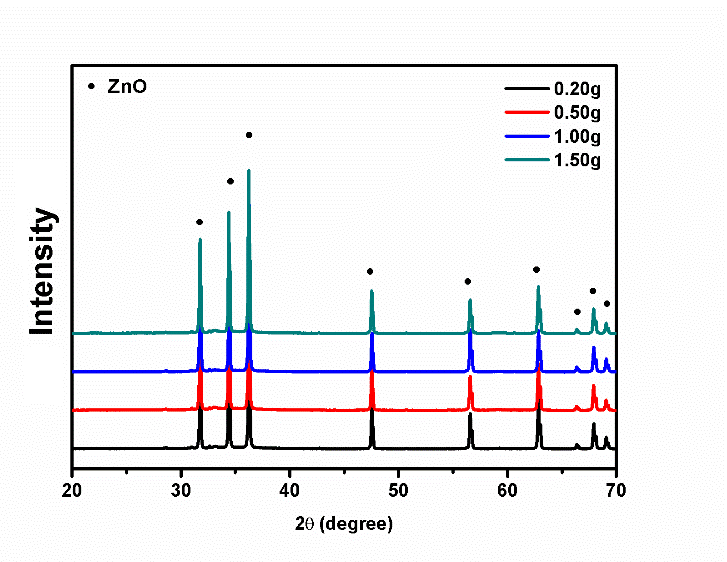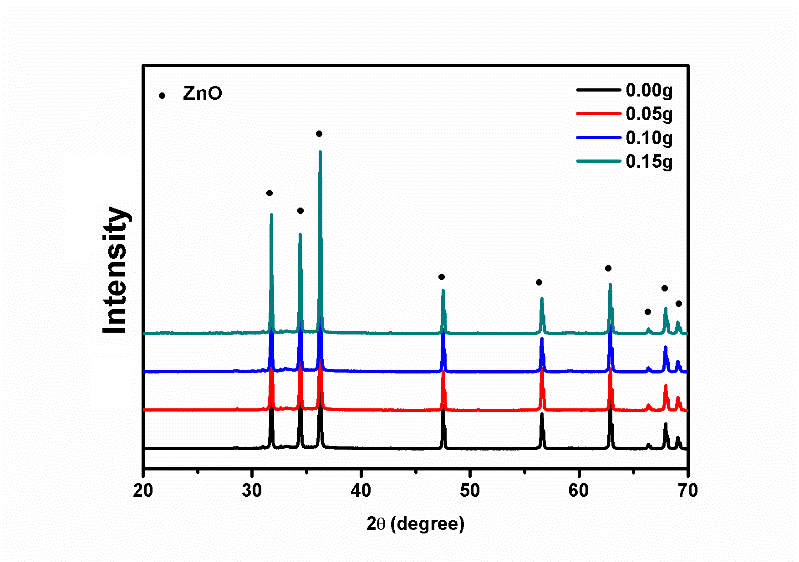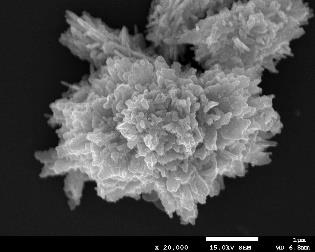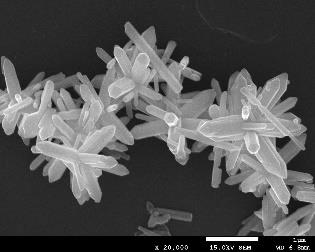纳米氧化锌的制备及光催化性能研究毕业论文
2020-06-28 20:12:48
摘 要
本文选用已酸锌为原料,通过加入柠檬酸和氢氧化钠,利用水热法合成花状结构纳米氧化锌光催化材料。利用XRD、SEM、FT-IR等实验方法对样品进行性能测试,并通过在紫外光下降解有机染料甲基橙来检测其光催化性能。
数据表明,采用柠檬酸作为形貌抑制剂,通过控制柠檬酸含量,来抑制ZnO(0001)极性面的生长。柠檬酸与锌离子会形成一种复杂的螯合环状复合物,并以其为基体,吸附锌离子和其他生长基团,最终形成花状结构。在这个过程中,柠檬酸的含量至关重要,太少就会不足以形成理想花状结构,太多则会使ZnO形成不规则的团聚物。
花状纳米氧化锌的光催化性能测试结果表明,理想的花状结构纳米氧化锌降解效果最好。分析认为,一方面,由于采用柠檬酸作为抑制剂,抑制了(0001)极性面的生长,导致花状结构中具有较多的(0001)极性面,而该极性面具有氧化锌各个晶面中最高的反应活性,导致纳米花状结构氧化锌的光催化活性较好。另一方面,采用水热法合成出的氧化锌晶粒较小,分布均匀,有利于对光子的吸收和光生电子-空穴对的迁移,使其更容易迁移到表面发生光催化反应。
关键词:光催化、氧化锌、纳米花、形貌控制
The preparation of nan-ZnO and its photocatalytic performance
ABSTRACT
In this paper, the flower-like nano-ZnO photocatalytic materials were synthesized by hydrothermal method, using citric acid, zinc acetate and NaOH as raw materials. XRD, SEM, FT-IR and other experimental methods were used to test the performance of the samples, and we used MO as organic dye for photocatalytic degradation experiments in visible light in order to detect its photocatalytic performance.
The data showed that the growth of (0001) polar surface of ZnO was inhibited by controlling the content of citric acid when using citric acid as a kind of morphological inhibitor. The citric acid and zinc ions will form a complex chelate ring complex to take it as the matrix, adsorb zinc ions and other growth groups, and finally form a flower structure. In this process, the content of citric acid is very important. If its content is little, it will not be enough to form the ideal flower structure. Otherwise if its content is too much, it will force zinc oxide to form irregular aggregates.
It was found that the degradation effect of ideal flower-like nano-ZnO was the best in the photocatalytic performance detection of flower-like nano-ZnO. On the one hand, using citric acid as inhibitor inhibited the growth of the (0001) polar surface, lesding to the flower-like nano-ZnO obtained more (0001) polar surface, and the reactivity of the polar surface is the highest among the various surface of ZnO. It resulted in the best catalytic activity of the flower-like nano-ZnO. On the other hand, the grain of nano ZnO is small by hydrothermal method with distribution uniform. These factors are beneficial for the absorption of photon and the migration of electrons or holes, which make it easier to migrate to the surface for photocatalytic reaction.
Key words: nanometer; photocatalysis; flower-like nano-ZnO; morphological control
目录
摘 要 I
ABSTRACT II
第一章 绪论 1
1.1研究背景 1
1.1.1 能源危机与环境污染 1
1.1.2 污水处理与光催化降解 1
1.2 光催化反应发展过程与原理 1
1.2.1 光催化反应发展过程 1
1.2.2 光催化反应原理 2
1.3 光催化材料 3
1.3.1 ZnO半导体材料 3
1.3.2 ZnO的不同制备方法 4
1.4本文研究的主要方向 7
第二章 实验部分 9
2.1 实验试剂 9
2.2 实验仪器与设备 9
2.3 实验过程 9
2.4 样品光催化活性检测方法 10
第三章 结果与讨论 12
3.1 水热法纳米ZnO样品表征 12
3.1.1 物相分析 12
3.1.2 SEM形貌分析 12
3.1.3 红外分析 14
3.1.4 紫外-可见分光光谱 15
3.1.5 光催化性能检测 16
第四章 结论与展望 18
4.1 实验结论 18
4.2 实验问题与展望 18
参考文献 19
致谢 22
第一章 绪论
1.1研究背景
1.1.1 能源危机与环境污染
近年来,人类社会发展速度不断提高,尤其是工业发展,由此带来的能源需求问题和环境污染问题引起了世界学者们的广泛关注[1]。一方面,现阶段人类使用的能源依然十分依赖石油、天然气,煤等,而这些能源属于不可再生的,短时间内无法恢复。数千年来,这些不可再生能源在不断使用中,储量越来越少,以后将难以满足人类社会发展的需求。另一方面,化石燃料在使用过程中会放出大量的温室气体,导致全球变暖,进而引起气候异常,海平面升高等环境问题。根据研究显示,20世纪全球平均海平面每年升高1.80 mm,并且升高速率在不断增大,预计2100年海平面将会升高279 mm[2]。因此寻找一种清洁并且可持续能源是摆在人类面前迫在眉睫的事情,而太阳能凭借其清洁可再生、分布大,能量多等特性,成为了世界绿色能源的首选。
1.1.2 污水处理与光催化降解
随着社会发展,生活中不可避免带来严重的环境污染,其中较为严重的就是工业废水。虽然政府和各行各业不断提高控制标准和增加整治措施,但大部分的污水在未经有效处理便排入到环境中去。工业废水排放的废水,特别是化学和染料工业,会影响到地表和地下水的质量,从而导致清洁水的短缺。世卫组织2015年的报告指出,91%的全球人口能够获得纯净的饮用水资源,但仍有6.63亿人缺乏纯净的饮用水。根据联合国世界水资源发展报告,全球只有20%的废水得到了适当的处理。在低收入国家,情况是最糟糕的,只有8%的废水被处理。
在各种处理方法中,光催化技术提供了一种分解污染物的潜在策略,因为它是一种基于光催化剂的光催化过程,可以利用其光催化作用来降解无机和有机污染物,并且成本低,效率高,是降解有机污染物较为合适的选择。
相关图片展示:







课题毕业论文、开题报告、任务书、外文翻译、程序设计、图纸设计等资料可联系客服协助查找。



